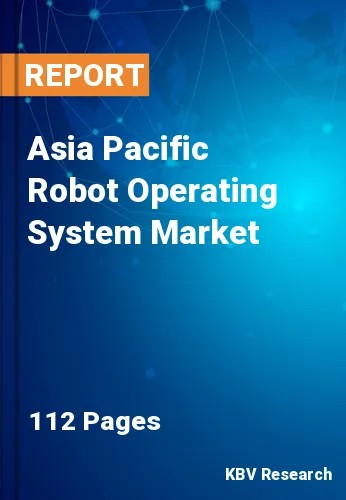The Asia Pacific Robot Operating System Market would witness market growth of 11.9% CAGR during the forecast period (2022-2028).
The improved version of ROS 1 is called ROS 2. It was created to overcome ROS 1's drawbacks. While maintaining the fundamental features of ROS 1, it also includes several enhancements, the most noteworthy of which is support for Data Distribution Service (DDS). For inter-node communication, DDS serves as a middleware.
In addition, real-time communication, scalability, performance improvement, and security advantages not seen in ROS 1 are provided by using the quality-of-service (QoS) profile. For additional functionality, ROS 2 may benefit from the same packages, libraries, and tools as ROS 1, such as Gazebo, Navigation, and rosbag. However, the main justification for ROS 1's retirement is the DDS middleware's capacity to improve communication between nodes, which makes ROS 2 the preferable option.
In 2018, a record US $16.5 billion was invested in the robotics sector globally, with the auto sector continuing to be the major user of robots, accounting for about 30% of the supply. Though still in its infancy, India's robotic startup sector is expanding thanks to rising demand for industrial robots. The volume of robot installations in India has been increasing quickly for a number of years, according to a news release titled India's Robot Wonder that the IFR issued 4,771 new industrial robots were sold in India in 2018, setting a new record and representing a 39% increase over the previous year. The market for robot operating systems continues to have growth prospects in APAC due to the widespread deployment of robotics in the region.
The China market dominated the Asia Pacific Robot Operating System Market by Country in 2021, and would continue to be a dominant market till 2028; thereby, achieving a market value of $107.4 million by 2028. The Japan market is estimated to grow a CAGR of 11.2% during (2022 - 2028). Additionally, The India market would experience a CAGR of 12.6% during (2022 - 2028).
Based on Application, the market is segmented into Plastic Injection & Blow Molding, Testing & Quality Inspection, Metal Stamping & Press Tending, PCB Handling & ICT, Co-packing & End of Line Packaging, Pick & Place and Others. Based on Type, the market is segmented into Scara Robots, Parallel Robots, Collaborative Robots, Articulated Robots and Others. Based on Vertical, the market is segmented into Electrical & Electronics, Automotive, Food & Beverages, Healthcare, Metal & Machinery and Rubber, Plastic & Others. Based on countries, the market is segmented into China, Japan, India, South Korea, Singapore, Malaysia, and Rest of Asia Pacific.
Free Valuable Insights: The Worldwide Robot Operating System Market is Projected to reach USD 954.2 Million by 2028, at a CAGR of 11.6%
The market research report covers the analysis of key stake holders of the market. Key companies profiled in the report include Kuka AG (Midea Investment Holding Co., Ltd.), FANUC Corporation, Yaskawa Electric Corporation, Microsoft Corporation, OMRON Corporation, Clearpath Robotics, Inc., iRobot Corporation (Amazon.com, Inc.), ABB Group, Denso Corporation, and Teradyne, Inc. (Universal Robots A/S).
By Application
By Type
By Vertical
By Country
Our team of dedicated experts can provide you with attractive expansion opportunities for your business.

